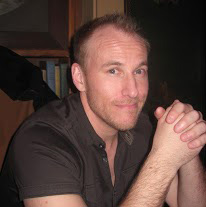
David Tomkins
David Tomkins’ students will learn about global rhetorics of survival through testimonies from the Visual History Archive following Tomkins’ teaching fellowship this summer at the USC Shoah Foundation.
Tomkins is one of three university professors awarded teaching fellowships for summer 2014. The Teaching Fellows program provides financial support and staff assistance to faculty members who wish to use the Institute’s life-history testimonies in their new or existing courses. Fellows spend 10-15 hours in guided research and consultation with Institute staff as they craft their course syllabi. Following the fellowship period Fellows give a staff talk based on their work and findings and submit their final syllabus for archiving.
Tomkins, who received his PhD in English from USC in 2009, teaches upper- and lower-division writing and critical thinking courses in the USC Writing Program. After learning about the teaching fellowships through former fellow Colin Keaveney, from the Department of French and Italian, Tomkins said he wanted to explore the Visual History Archive for his own courses.
He particularly wanted to experiment with integrating survivor testimony into Writing 150, the lower-division writing course he will teach during the fall 2014 semester, and to explore the archive for footage that could be used in his upper-division writing course (Writing 340) during the Spring 2015 semester and beyond.
“I also sought to gain knowledge about the Visual History Archive that I could share with my colleagues in the Writing Program who, given the integral role our courses play in the context of General Education here at USC, are in a unique position to introduce the VHA to students and to assist them in unpacking its many lessons,” Tomkins said.
Tomkins’ section of Writing 150 is titled Identity and Diversity in Global Contexts. Survivor testimonies in the VHA will act as foundational texts as the class explores the role language and rhetoric play in the persecution of difference, as well as the way perspectives on survival can shape racial, ethnic, religious, and sexual identities, Tomkins said.
Students will view, discuss, and give presentations on testimonials within the VHA, and incorporate survivor testimony into at least two of their four required essays.
“Engaging with archival materials will also enable students to sharpen their analytical and argumentative skills by completing supplementary assignments asking them to compare testimonies by more than one survivor on the same topic and stage written and oral debates concerning the relationship between testimony and identity formation that VHA materials lay bare,” he said.